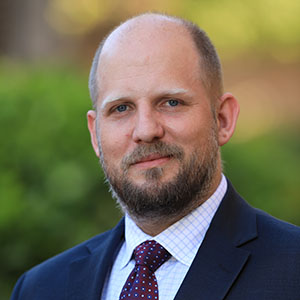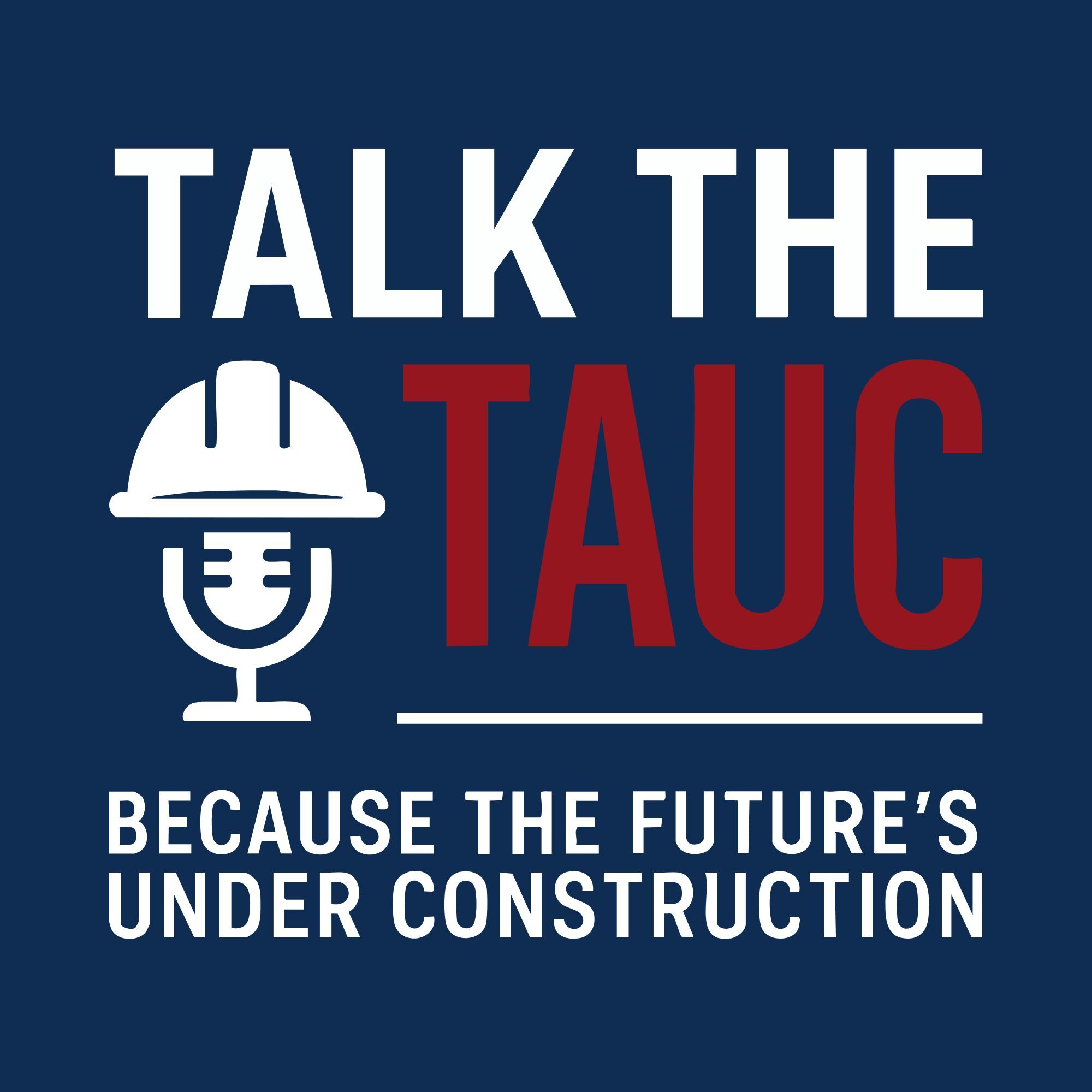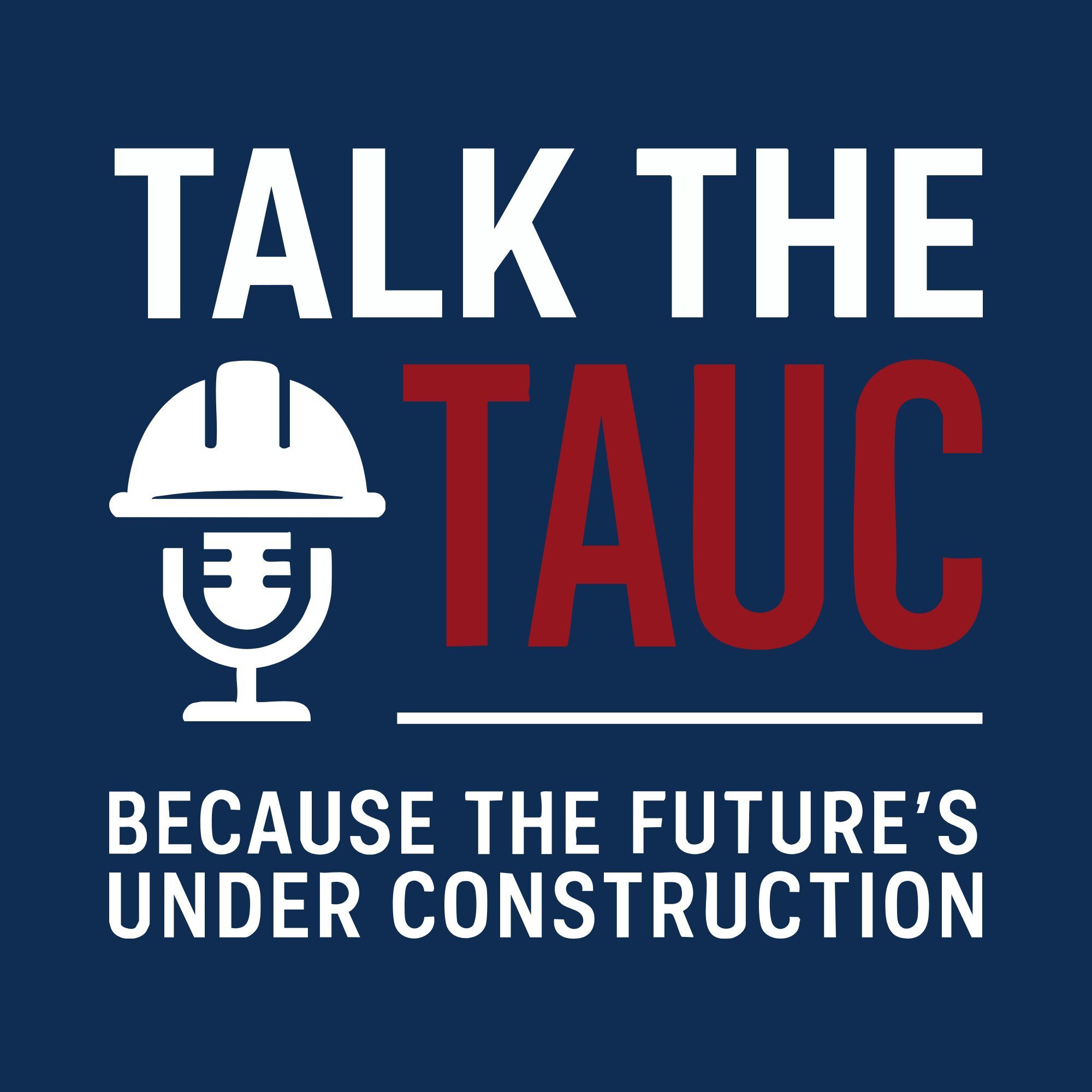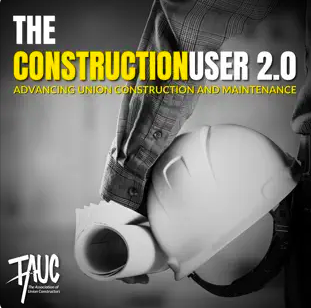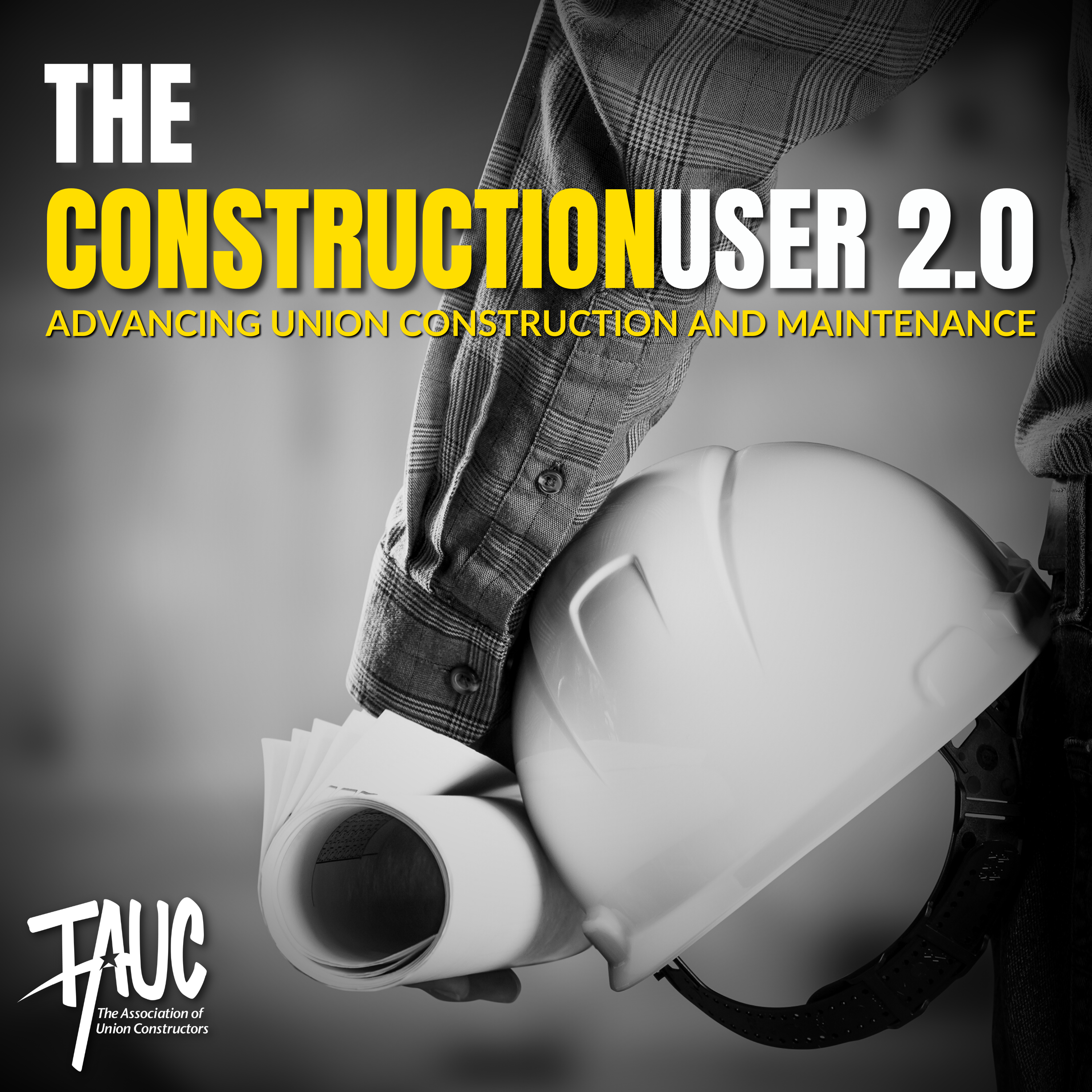Episode Transcript
Kirk: Hello and welcome to the Talk the TAUC podcast where we explore the people, partnerships, and projects shaping the future of union construction and industrial innovation.
Our guest today is a third generation boilermaker and a lifelong resident of Western Pennsylvania. He currently serves as a business agent and inspector for Boilermakers Local 154 out of Pittsburgh, where he advocates for members, negotiates contracts, and ensures job site safety and quality across some of the region's most complex industrial projects.
Raised in a town built around coal and hard work, he's seen firsthand how energy and industry shape not just careers, but entire communities. Now, he's playing a key role in a $10 billion redevelopment effort that's transforming the shuttered Homer City coal plant into one of the most advanced AI- and natural gas–powered data centers in the country. He brings the voice of the field, the pride of the trades, and a front row view of how labor is powering America's next energy chapter. Please welcome Shawn Steffee.
One of the first questions I like to ask everyone is always a little bit off-topic and that's by design, but what's the last song you got stuck in your head?
Shawn: I would have to say the shark song from cartoons of my grandkids. That one that drives everybody nuts. I can't remember what it is.
Kirk: Baby shark?
Shawn: Baby shark, yeah.
Kirk: Yeah. I have kids. I get it. Certainly been stuck in my head as well. Let's go all the way back to the beginning. How did you get your start in the trades?
Shawn: I went to Williamsport Area Community College. When I got out of there, I ended up back in my hometown working in manufacturing, building food grade, medical supplies and food conveyors.
After 10 years, NAFTA came and I lost my job. The power industry in my hometown area in Indiana County—we had Keystone, Kokomo, Seward, Shawville. Everybody said the boilermakers were hiring, so I went and got an apprenticeship at the boilermakers, and basically the rest is history. It's been a great career for me.
Kirk: And now you are a business agent and inspector, is that correct?
Shawn: Yeah, I'm a business agent and I'm our sergeant-at-arms and inspector. I'm also the president of the South Central Building Trades, which will be in this new plant built here, which will fall under my building trades.
Kirk: Walk me through that. For those of people that aren't necessarily familiar with union leadership, what do the business agent, sergeant-at-arms and inspector roles do?
Shawn: For me as a business agent, I have a jurisdiction that given counties, whatever plants, whether it's a steel mill, paper mill, gas plant, coal fire plant that falls under those counties, I'm the one that gets the manpower for those jobs and those outages. I visit those facilities, man their jobs, go to the pre-job stuff like that, and make sure that every guy and girl that I represent, and members, that everything's taken care of.
As the inspector, I keep control of the monthly meetings, the building maintenance and stuff like that here at our union hall, just basic union stuff here at the hall.
Kirk: Now, you're from the Homer City area, right? That's where you grew up.
Shawn: Downtown, 58 years, yep. In July it'll be 58 years.
Kirk: So you've seen this, the Homer City Coal plant probably throughout your life, that there's been a big transition going on.
Shawn: Oh, exactly.
Kirk: Talk to me a little bit about the history. Before we get into what's happening now and what's going, talk to me about this plant through the last 58 years.
Shawn: I can tell you growing up in Homer City, it's been an icon. The skyline is part of Homer City with the, at the time, largest stack in North America, the largest coal plant in all Pennsylvania and coal mining.
I come from a coal mining town, and everything evolved around coal, down the whole little league. The miners took vacation in July. There was no little league because everybody was on vacation.
As you know, coal started to diminish. Things the coal plant still was viable is a generator. I don't know how many millions of man hours we've had out of the Homer City facility as the coal plant for the boilermakers and the building trades, as that goes. We watched it slowly slow down on the war on coal. It was still viable, and then all of a sudden where we came to it was closed.
Kirk: Talk to me about the impact of that. You said the whole town is based around it and it's closed.
Shawn: It was closed. The ripple effect jobs from trains bringing in coal, to trucking, to the tax base for our community and school district, everything was pretty much devastated. The town basically evolved around the coal plant.
If you ask me, in my opinion, it was a total gut punch when it went under. Now, we're on the verge of something new. I hope that everybody can be very positive to what's coming.
Change is hard. Everybody's used to coal and what that brought. Now, we have a different entity, and I think it's going to be fantastic once everybody understands what this is going to be about.
Kirk: Let's talk a little bit about that. We've got a $10 billion plan to come in and revitalize that. What is that going to mean? If you had a crystal ball, what's that mean for Homer?
Shawn: For me, the members that I represent, and the building trades that I represent, it means 4–5 years of unbelievable employment opportunities in the construction field for Western Pennsylvania and my county and hometown. It means a whole new round of ripple effect jobs.
We're just talking about the power build here on the $10 billion. We're not even begun to touch the tip of the iceberg on the hyperscale data centers and what that's going to bring. Probably another $10 billion on top of the power build.
Now, you are transitioning into new tech jobs, onto computers and a new maintenance to be performed on the facility. I think it's going to be a breath of life into the community and our school district. It's going to be a challenge, but the boilermakers and the building trades are ready for this challenge.
This isn't like we've not done this before. Prior to building this, we built $14 billion worth of natural gas here, including the cracker, including taking care of our three big coal facilities, a waste burner, and our steel mills.
The people divide. I get to town, they're like, what are we going to do? What are we going to do? I'm like, what do you mean what are we going to do? We built three great big coal fires here in the 70s. We were able to take care of business. Everybody benefited from all these plants being built. It's going to be the same thing here.
We're going to have to learn how to take what is given, the ripple effect jobs, and what that's going to mean other than the construction jobs. I know what it's going to mean for us in construction, but it's the townspeople that's going to realize what is going to come in the future with the plant being built there.
Kirk: Now, I don't want to go completely off track, I know what you mean by the cracker, but some people might not. Tell me very quickly about the cracker plant.
Shawn: Well, it's a shell ethylene cracker plant that they make plastics using natural gas. At the time when we built that, it was the largest project in North America.
Let's put that into perspective to where we're at on this plant right here. Now, this plant is going to be the largest private investment in the state of Pennsylvania ever, on the 10 billion just on the power build, and not counting the hyperscale data center. We're eclipsing what we just did on the shell ethylene cracker plant. It's going to be right up at that level. Bigger.
Kirk: It's going to be amazing. Now, people hear about natural gas and AI-powered; we haven't touched on that yet. This huge data center. You think Silicon Valley. You don't necessarily think Western Pennsylvania. How do you think that's going to change? After the build, how do you think that's going to change Homer City? How's that going to change the landscape of Western Pennsylvania?
Shawn: Well, I'll tell you how I would like it to change.
Kirk: Let's go for it.
Shawn: We've closed so many coal fire plants, Reesedale, Elrama, Masontown, all Western PA plants. We got two more that are looking to evolve into something. I'm thinking, what better to evolve into than natural gas, and data centers that will all be a part of, as we transition into this, and bringing back all these construction jobs in the Western PA, building out this infrastructure.
I think it's a new page for the area on the AI. A phrase I love to use is, I really don't know a damn thing about AI, but the building trades and the boilermakers sure as hell know how to build power plants.
I think it's going to be something great moving into the future. I would like to see them come to other places because the infrastructure's there. The transition would not be that hard. The skilled labor force, the union labor force we have in Western PA, I don't want to sound biased, but second to none. We did it. We're proven. It's not like our first bowl of Cheerios here.
We know what we're doing and it is going to be a challenge, but every one of us in the building trades and especially my business manager, Mike Stan and us, we're ready for the challenge. We're ready to get our numbers back up, train new people, get new members to build out this infrastructure, and the future. It is the next industrial revolution and we want to be a part of it.
Kirk: Love that. Now you touched very well on this. Next thing I wanted to talk to you about is you are the chief inspector, sergeant-at-arms of inspection over all these things. But this isn't a coal plant. This is new. This is natural gas. This is AI. How is that going to change your job? Obviously, there are new things to learn and new skills. How's that going to affect?
Shawn: For all of us here just in the building trades, it's going to affect us and we need to train on the new technology. For us as the boilermakers, it's nothing really new, but we got to do better, advance ourselves on rigging. We got to advance ourselves on the welding procedures. We got to advance ourselves on the new technology that's coming, and the rest of the building trades on the AI.
It takes massive amounts of HVAC heating and cooling on these hyperscale data centers, and everything transitions. But with all the colleagues and brothers that I work with in the trades, they're all ready for this. This is something that is going to bring a lot of employment opportunities for us in the building trades.
I think it's the right fit, especially in Western PA, especially being an energy state, and I think it's going to be a great thing to come forward in Southwestern PA. We have all the natural gas we need with the Marcellus and Unity Shell. We have a great core of workers union building trades, and what else can we ask for?
This is a great opportunity, and there's nobody else coming to make a $10 billion investment in an old coal town. They're not going to build Sunny Acres housing development up on top of that ash site up there in that old coal plate. This is the fit. This is what we need to do. For me—and it's my opinion—this is the best scenario.
Kirk: How are safety concerns different, coal versus natural gas? What is the difference in just the work environment from what it was to what it will be?
Shawn: It's a safety concern. You're going to need the pipelines. You're going to need compressor stations. You have the safety concerns on the pipeline infrastructure. Before, it really wasn't an issue with train, trucking, and coal. As far as environmentally, for me it's a no brainer. So let's just take this into consideration.
I've read a few articles and did a few numbers myself. By no means am I an environmental engineer. If you were going to build out energy in solar or wind to this magnitude and put this data center there, just solar alone at 50% efficiency, which is what you're probably going to get, you would need 75 million solar panels and 250 square miles of land to come up with the 4200 megawatts.
If you were going to do that with wind, you would need 1875 square acres and (I think) it is 1700 windmills. Everybody's so nervous about like, oh, we're gobbling up land, we're gobbling up land. Well, we're not even begun to gobble up land when you consider renewables. I'm not against renewables, but that's just not feasible. This is going to go on a 3200 acre track. They got room to put seven more units on that 3200 acre track. You see what I'm saying?
Kirk: Yeah. It's not even that much of a land grab, exactly.
Shawn: That's a no brainer. This is the future right here, AI. If everything that we're reading and what we're being told, this is what we have to become, produce this massive amount of electricity that we're going to need in the future. This has to be part of it. There's nobody better to build it than the building trades, especially here in Pennsylvania.
Looking forward to the challenge, we all are. The safety concerns, I think they're less of a problem environmentally. Again, it is going to be union craftsmen that live right here that are going to build this facility. That's Pennsylvania natural gas, that's Pennsylvania workers, that's Pennsylvania union tradesmen that live in these towns.
Since the 70s, we have built these coal plants. There are generations of men and women that have been in the building trades, that live in these areas, that can't wait to get on this build and get started. It's a winner.
Kirk: Is there a downside? It doesn't sound like there's a single gray cloud on this. Is there a downside to any of it?
Shawn: Here's the downside for me as a boilermaker. Of course, we're not going to have the much maintenance on these gas facilities that we had on the coal facilities. I don't know what to expect on the data center part of it. Not all of us are going to enjoy the fruits of a data center. A boilermaker doesn't have a lot to do with a data center. There are other trades that don't, but it is a big win for the pipe fitters, the electricians.
I guess the downside of it is the maintenance jobs at the end are not going to be as abundant as what it was on the coal fire units. But that's why I'm pushing that we need to build in these other brownfield sites, then we can have a cycle. Let's not build everything one time. Let's go from this one to this one. We have the infrastructure, but we go out to be positive in the state of PA.
The big thing that frustrates me politically is debate politics on other things. If everything is true, what the PJM, NERC, FERC, and all these other ones are telling us on the electricity generation that we're going to need this for AI, cryptocurrency, electric vehicles, this total demand that we're going to have, we're well-suited to build it right here in Western PA. This could be a boom for us for the next 10–20 years.
Then we can move forward into whether it might be nuclear, SMR, or maybe renewables. Can up what they're doing. But right now, for me in my opinion, it's got to be natural gas. This is the quickest solution. We got an abundant amount of natural gas in Western PA, we got a great workforce like I said, and let's go for it. Let's get it done. That's where I'm at.
Kirk: So 5–6 years from now when this project comes to a conclusion—you talked about this a second ago—obviously there won't be the same amount of maintenance work on this as there was on a coal factory. Does Homer City stand to be an example of what we can do with some of these other old coal mining towns?
Shawn: Benchmark? This could be a benchmark for what's to come. The other thing that this might evolve into, you got to realize these turbines that are being installed at this facility are from GE Vernona, and they have the capability to burn a mix of hydrogen and natural gas.
Maybe six years down the line hydrogen becomes more prominent, and we can start producing hydrogen on site and mixing whether it's 50/50, 70/30, whatever it is that has the capabilities, this could evolve right into something new. Maybe by then, we have the right shelf formations in Western PA for carbon capture and storage.
We got whatever the future holds, and the environmentalists like, we're ready. Whatever you want to build, we're ready to build it environmentally. Every one of us live in this area. We all love clean air and fresh water. We live where our families live here. But we also know that we need to build and we have to show progress. I figured this is the first foot forward on progress, and it's going to be using fossil fuels.
The data just doesn't line up. I would if everybody could just say, hey, we're going to put solar panels and windmills up, we'd be there already. We're not. We're not even close. This is why we got to go this route.
I'm not an environmental engineer. This is just me being in the field and building energy infrastructure. This is what we got to do.
Kirk: This is a two-part question. Ten years from now, it's done. It was a massive success. It's working. Everything you just said has come. Ten years from now, what does the industry look like for the other coal towns, for the other things that these brownfield sites, that we can start to transition? And also, what does Homer look like 10 years from now? What has become of your town?
Shawn: I think that all my hometown would really like to get back to is where we were in the days of coal, when we had 150 kids graduating from our high school senior class, not 45, not 50. I like to see more stores and even local bars that once thrived under a coal town, and blue collar workers.
We're not looking to be a metropolis, but we can also keep ourselves as a rural town, but a booming town. I think that our school district and our county is going to be very happy to where they're at 5 or 10 years from now, from the tax revenue that comes with building a facility like this.
I've told a couple of guys in my hometown, they're trying to clean up the legacy that was left behind from coal, and I'll be the first to admit, yes, we have streams that have been poisoned, and we have land that needs reclaimed. I think what better of a start to begin that process than to get people like the ones that may be Meta, Amazon, Microsoft, whoever's going to build these data centers, to come in and help funding on cleaning our streams, cleaning our community that's been left with the legacy that's left.
There are all kinds of things that we can do. They're figuring out now and the fly ash that they can get the rare earth minerals out of it. This could be an ongoing thing that we just keep building and building and building out, reclaiming what we've had and what's been left behind, and moving forward with something like this.
Kirk: So just wrapping up, if you could talk to 20-year-old Sean, if you could go back to 20 years ago and give him any advice for where we are now, what would that be?
Shawn: Twenty-year-old Sean, if I could go back and give him any advice, I would've done better in high school when I wanted to play college football.
Kirk: Valid.
Shawn: How's that sound?
Kirk: Totally valid.
Shawn: Honestly, I have no regrets. The building trades and especially the boilermakers, my local, local 154 has given me all that I could want. I've put two kids through college. It's hard, dangerous work, but it's very rewarding.
I look forward to trying to get young kids now, men and women involved in the trade. I think that's a part of the problem right now. We have to tell everybody the truth of where we need to be.
The numbers don't lie. We need to be able to start going after these kids that are in high school and even younger, telling them there is a future especially in the building trades, blue collar work. It can be very rewarding and very gratifying financially. It will give you a great family-sustaining wage. We got to let them know there's a need for us. We need them. We need these young kids to come out and go for these jobs. We got to train.
A lot of my workforce are in their 40s and 50s. We need to start passing this onto the next generation, but they can't be fed that oh, that way of life is gone. We're not going to use fossil fuels. We don't need that skillset. We do. We absolutely do need it.
Again, I don't want to be the bad taste on renewables, but these skilled trades are more than just bolting a solar panel onto a standard. These are highly skilled jobs of rigging and welding held to the highest standards. We need to be able to train for the future. We need a positive outlook from politicians on both sides.
It's still here and it's not going anywhere. We've been around 130 years. I think we're going to be around for another 100 years. AI might be replacing some jobs, but it's still not going to replace the construction worker. Build 100-foot stacks and building boilers. Robots aren't ready to do that yet, and I don't think that's ready for the future. You need skilled men and women to build that.
Kirk: So over the next five years at least, you've got your work cut out for you, you and the building trades in Western Pennsylvania. What are you most looking forward to as a part of this job?
Shawn: For me, I'm going to be 58 here in July. I'm looking forward to the next four or five years with a booming amount of labor needs. When I go and leave, I leave on a positive note with a lot of work for my local and for the other trades. As the building trades president, all of our unions are thriving and we're completely training the next generation.
Let's face it. Our training centers are second to none. Our instructors are second to none. Every one of us is ready to take on this challenge. This will be part of what we do in the future. We get more men and women involved. We keep training, we grow, and (I think) that's what I'm looking forward to in the next five years.
Kirk: Is this going to change training? Changing to natural gas over coal, is this going to change the training paradigm there in Western PA?
Shawn: Well, it will change it in some ways, but at the end of the day, the welding process is the same. The rigging process is the same. We're still going to put a crane on site. We're still going to hook up chokers and shackles. We're still going to weld tubes together. They're still going to be welding pipes. Maybe the requirements will change a little bit, but at the end of the day, it's still basic. Trade's been shipped.
The AI part of it in the data center, sure there might be some things changing on that, but the core of it's going to be the same and we're the best. I always tell them that old saying, Jack of all trades, master of none. Well, we're masters of our trades, every one of us, and we would like to continue that forward.
Kirk: Well, Sean, thank you so much for your time, not just for the conversation, but for everything you're doing for Western Pennsylvania and for Homer City.
Shawn: You got it, Kirk. Appreciate the time here today.
Kirk: Shawn, thank you for sharing your story and reminding us that behind every headline about energy or innovation, there are real people doing the work. Your commitment to your community, your craft, and the future of union labor is an inspiration. We're grateful for your time, your voice, and your vision for what comes next in Homer City and beyond.
